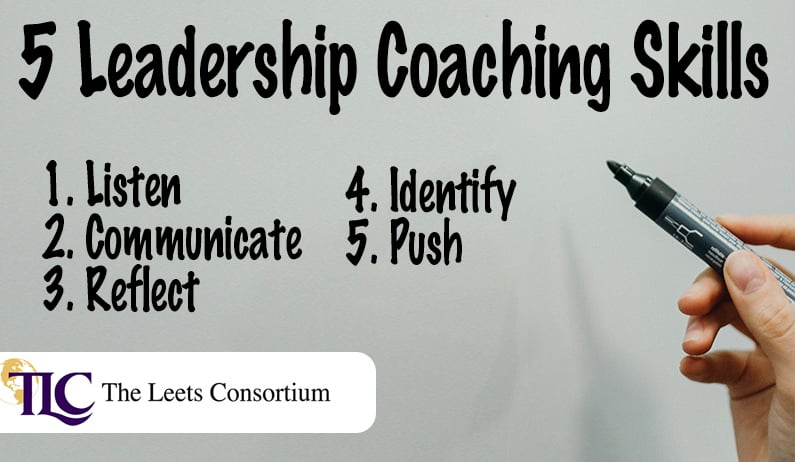5 Leadership Coaching Skills Executives & Leaders Need To Know
Coaching | Jan 21, 2021

Managers, leaders, entrepreneurs, and people in similar positions find themselves responsible for more than just business operations. As a leader or executive in today’s volatile and ever-changing business landscape, you play a vital role in developing employees and will find yourself in need of coaching skills too.
Below, we dive into the most important leadership coaching skills that people in an executive or management position needs. We also consider why coaching skills for leaders should be considered essential.
What Skills Are Needed For Coaching?
The ultimate role of a business coach is not to direct. Instead, it is to advise, motivate, and assist. To create leaders as coaches, it is important for a person to first understand the skills that make a coach effective. The most effective coaches generally share similar skills and strategies, even though there are a few different coaching styles.
In this section, we are going to take a look at the skills that successful coaches need to adopt. These skills are not only important for coaches but can also be useful among leaders who are responsible for managing people.
1. Listening
For a leader to develop coaching skills, they first need to learn how to listen. Hearing what someone says is different from truly listening. For organizational development to be successful, a coach needs to be able to hear what the current issues are and then use this information to devise a strategy. Being an active listener is also part of building trust.
2. Communication
Listening is only one part of the coaching process. Coaching culture also requires communication abilities. To develop employees and improve performance, the coach and leader need to be able to communicate with the staff.
3. Reflection
The ability to effectively reflect on the current situation is important. This can help to enhance employee engagement. Learning technologies can be used in this particular process, as data can be entered to help identify aspects that should be improved. To reflect, open questions need to be asked – and employees should be allowed to answer honestly.
4. The Ability To Identify Strengths And Weaknesses
Every company has its own strengths and weaknesses. The same goes for the employees. Learning and development among staff depend on taking advantage of strengths while also addressing weaknesses. When it comes to developing your coaching skills, focus on the ability to quickly identify the strengths and weaknesses in any situation.
5. Motivate People With The Right Challenges
Challenges are important for the growth of employees – and when they grow, so does your business. One of the most effective coaching tips is to provide people with a challenge. You do, however, need to develop a skill to know when to offer a challenge, how the challenge should work, and when a specific type of challenge may be inappropriate.
What Are The Five Leadership Skills?
In addition to adopting certain coaching skills, there are also specific leadership skills that people in management positions require. These skills help to provide a more effective role as a manager. There are five essential skills that will usually be covered in leadership training. These skills for leaders play a part in ensuring the leader is able to communicate with a team – and drive a business forward. Both managers and leaders need to ensure they know about these five skills and adopt them as part of their succession plan.
Here is an overview of the skills that create effective leaders:
- Being Able To Offer Direction: A sense of direction is important among employees, regardless of their role. As a leader, being able to offer employees direction is critical. This is especially important if the leader wants to give employees an opportunity to grow and reach greater heights – something that is sure to help with internal motivation. The leader needs the skills to identify the right tasks to assign to every staff member. These tasks should be able to help drive the individual forward – not only to help improve the performance of the business but also to ensure the individual is able to reach their own goals.
- The Skill To Be An Active Listener: A lot of managers consider their own voice the most important. Sure, the executive or person that is the leader of a team has the final say. This, however, does not mean they should be the only ones that may speak. The ability to be an active listener can be exceptionally helpful for any leader. This allows the leader to identify problems in the workplace. In some scenarios, these problems might be what is holding the company back.
- Being Able To Limit An Authoritative Approach: The manager or executive is in charge; there is no doubt about this fact. At the same time, allow employees to have a say in projects and assignments too. While you should display your authority, avoid making employees think that they have no power at all.
- To Be Respectful: When delivering tasks and comments to employees, the leader requires the ability to be direct – but without adding an emotional attachment to any type of situation.
- A Creative Mind: Another critical leadership skill is to have an open and creative mindset. Creativity is crucial when it comes to running a business and setting up projects for long-term success.
Why Do Leaders Need Skills In Coaching?
As a leader, your job is not just to ensure your business is making money and the internal processes are running without issues. Whether a manager, executive, or even a supervisor at a local branch – you may also find yourself responsible for staff.
Many leaders are looked up to as role models. When a staff member has a problem, they need to be able to get in touch with the manager. The manager needs to be able to listen to the problem, understand what the issue at hand is, and easily devise a plan of action. To thoroughly understand staff and resolve issues, leadership skills alone may not be enough. The same goes for situations where the manager would like staff members to succeed in the work environment yet sees a lack of performance.
Coaching skills training for a leader can be exceptionally useful in these scenarios, but the opportunities where such skills can be used are not limited to these events only.
Below, we take a look at a few reasons why leadership development programs should ultimately also help leaders adopt coaching skills too.
- Since leaders work with teams in most cases, coaching skills come into play as a motivational tool. No matter the leadership styles practiced, adding coaching skills to the mix helps the executive or leader keep an entire team motivated more effectively.
- Many leaders find that having a grasp on at least the essential coaching skills help them create a deeper connection among a team. This could include a leadership team or even a group of employees in the department.
- Coaching skills also help the professional provide better tips for their employees. There are times where an employee may need advice related to their career. When the leader has the appropriate coaching skill, they can provide advice that will help the employee. When the employee is provided with such advice, they may become more motivated. Motivation leads to enhanced performance in an organizational structure.
- When it comes to coaching employees, a leader being able to take charge of an educational session leads to numerous benefits. It helps the leader connect with the employees. It also ultimately saves on costs, compared to hiring an executive coach to help provide conferences for the employees.
Conclusion
Any person in a leadership position will get to a point where they have to mentor staff members, a colleague, or someone else. During these times, leadership skills alone may not always be sufficient. Being able to exert skills associated with coaching can be helpful in such scenarios. Coaching skills for managers to help with team performance and enhances the operations of the business itself. The skills outlined in this post improves performance not only among each individual in the workplace but also for the company as a whole.
References
- https://hbr.org/2019/11/the-leader-as-coach
Subscribe to our Newsletter:
Receive leadership and professional development insights straight to your inbox
How can we support your success?
We’d love to get to know you and learn more about your organization’s leadership development initiatives.

